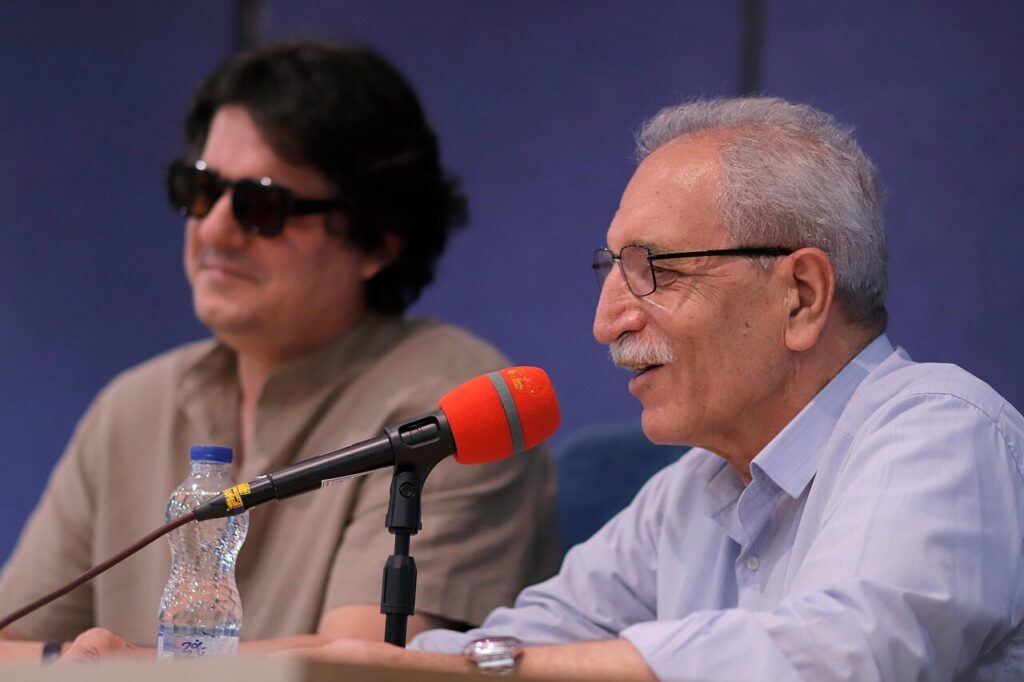TEHRAN – An announcement and analysis of the Persian translation of the book “The Great Silence” (“Mec Irutyune”) by the well-known Armenian author Perch Zeitansian took place on Wednesday at the City Theatre Complex in Tehran.
The book’s unveiling ceremony was held at the complex Mashahir Hall, along with the presence of renowned Iranian playwrights, playwrights and theatrical directors.
Translated from Armenia by the renowned Iranian translator Andranik Kechumian, the book was recently published by Tehran Ayas Publications.
Speaking at the ceremony, Qotbeddin Sadeqi, a well-known playwright, scholar and theatre director, analyzed all three plays in the book and addressed the issues of identity reflected in these works. Sadeki described Zeitantisian as a great playwright who continues to be aware of the history of his country.
He was followed by the well-known composer and conductor Maestro Loris Varian highlighted the historical connections between Iran and Armenia, and the longstanding friendship between the two countries rooted in shared history.
Linguist and researcher Andhranik Simoneyan discussed the emergence of Pan Torqueism and highlighted how effective and documented Armenian genocide is in these plays.
University professor and Iranian director Mahmoud Reza Rahimi emphasized the importance of reflecting historical events in theatrical works and explained the need for this practice in broad detail. He praised Zeitantisian’s efforts in this regard.
All speakers praised Quechumian’s smooth and fluent translation. Additionally, Andhranik Simoneyan composed the play poems in Persian.
In his turn, Andhranik Kechumian expressed his gratitude for the presence of all participants. The session was hosted by playwright and theatre director Javad Atefeh.
Perch Zeytuntsyan (1938–2017) was an Armenian playwright, screenwriter and well-known screenwriter, renowned for his contributions to Armenian literature and culture. Zeytuntsyan studied at Agayan School in Yerevan and published his first short story, “Nvere” (Gift). Over the years he wrote many novels and novels, many of which have been translated into Russian, Czech, Bulgarian, Hungarian and Baltic.
Zeytuntsyan’s theatrical career began with the 1974 tragic comedy “Amenatkhur Marde” (The Sadest Man). He wrote ten plays, including The Legend of the Abandoned Sity and The Great Silence, often exploring the themes of Armenian history, identity and authority influence.
The recurring motif of his work is Armenian genocide, reflecting the rise of nationalism in the late Soviet era. His films and scripts, including “The Chronicle of the Yerevan Era,” further introduced his versatility. He served as Armenia’s Minister of Culture from 1990 to 1991, leaving an indelible mark in the country’s cultural landscape and earning many accolades, including the Armenian State Award.
The Armenian genocide was primarily a systematic mass extinction of Armenians by the Ottoman Empire during World War I, mainly between 1915 and 1917. An estimated 1.5 million Armenians have been killed by mass shootings, forced deportation, starvation and brutal violence. The Ottoman government was aiming to eliminate Armenian population, support Russian enemies, and accuse them of portraying them as a threat to the stability of the empire. Armenians were forcibly taken away from their ancestors’ homelands, many died along dangerous marches through the Syrian deserts. Genocide is widely recognized as one of the first modern genocides.
Photo: Iranian translator Andranic Kechumian speaks at the Persian translation ceremony for the book “The Great Silence” held at the City Theater Complex in Tehran on May 21, 2025.
sab/

